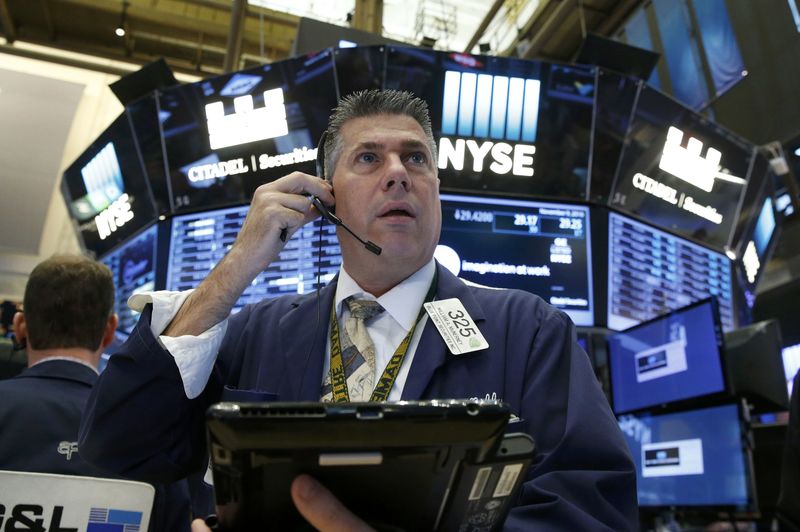By Sinead Carew
New York (Reuters) - Wall Street stocks rose sharply on Wednesday, bouncing from a dramatic overnight sell-off, while the Mexican peso was battered as investors reacted to Donald Trump's surprise win in the U.S. presidential election.
After sharp declines in U.S. stock futures overnight, equity investor panic eased but bond investors pushed up Treasury yields as they worried Trump's policies would ultimately weaken the dollar and hike inflation.
U.S. long-dated Treasury yields rose to 10-month highs on Wednesday, bolstered by expectations that Trump will enforce protectionist trade policies that will weaken the dollar and boost inflation.
U.S. 30-year bond (US30YT=RR) yields, which move inversely to prices, gained 22 basis points in their biggest jump since August 2011. Benchmark U.S. 10-year note (US10YT=RR) yields climbed to their highest since January.
The U.S. dollar hit its highest level against the Japanese yen
The Mexican peso recouped some losses after falling to a record low. The currency has been vulnerable to Trump's threats to rip up a free trade agreement with Mexico and to tax money sent home by migrants to pay for building a border wall.
The three major U.S. stock indexes rose as investors piled in to financial and healthcare stocks on hopes for less onerous regulations in those sectors than they had feared from a Hillary Clinton presidency.
"If you take Trump’s policies at face value, they are favourable for economic growth and inflation," said David Lefkowitz, senior equity strategist at UBS Wealth Management Americas in New York.
He cited Trump's promises for lower taxes, infrastructure and defence spending, less regulation and higher trade barriers, as long as those barriers do not dent growth too much.
Goldman Sachs chief investment officer Sharmin Mossavar-Rahmani advised private wealth clients on a call to "stay the course" on expectations for a large stimulus bill from Trump.
Investors also recalled that the market's dramatic decline after Britain voted in June to leave the European Union was short-lived and was ultimately seen as a buying opportunity.
But some money managers talked about near-term uncertainty as the world awaits January's inauguration for more concrete details of what a Trump presidency means.
"The market needs to hear more from him; they need to hear who is going to be in the Cabinet and whether these people are credible," Quincy Krosby, market strategist at Prudential Financial (LON:PRU) in Newark, New Jersey.
At 2:05 p.m. (1905 GMT), the Dow Jones industrial average (DJI) was up 214.45 points, or 1.17 percent, to 18,547.19, the S&P 500 (SPX) had gained 18.98 points, or 0.89 percent, to 2,158.54 and the Nasdaq Composite (IXIC) had added 30.75 points, or 0.59 percent, to 5,224.24.
Pledges by Trump in his victory speech that he would forge strong relations with other big nations helped ease some concerns about heavy tariffs being slapped on imports to the United States and a starkly more aggressive geopolitical attitude.
UNCERTAINTY
But emerging markets bore the brunt of the Republican nominee's victory, with Mexico's peso <MXN=> still down 8.7 percent after falling more than 13 percent to hit a record low overnight. [EMRG/FRX]
European stocks (FTEU3) closed up 1.6 percent after having fallen as much as 2.3 percent. MSCI's broadest index of Asia-Pacific stocks outside Japan (MIAPJ0000PUS) had ended down 2.3 percent and Tokyo's Nikkei (N225) closed down 5.4 percent.
In commodity markets, safe-haven gold sharply pulled back initial gains and was up 0.6 percent at $1,276 an ounce after climbing as much as 4.9 percent to $1,337.40 <XAU=>.

Oil prices recovered along with U.S. equities, with Brent crude (LCOc1) up 0.8 percent at $46.40 a barrel and U.S. crude (CLc1) rising 0.9 percent to $45.39. [O/R]